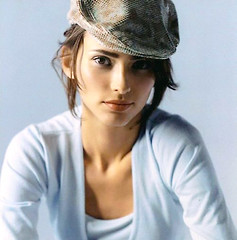I'm not sure why I decided to accept a casual invitation to go along with some friends who wanted to see Star Wars Episode III, some of whom had seen it before. I don't think my attitude towards George Lucas and the prequels is too different from that of everyone else who loved the first three; we trudge to the cinema with a feeling of deep disappointment but with a sense of stalwart loyalty. Or perhaps it was because I wanted to see how someone who could do so little with so much. Like every struggling filmmaker who counts the ticking of rental on the rented HMI's and dreams of million-dollar budgets, I would like to scratch at the coattails of the man who own Industrial Light and Magic but cannot seem to afford the affront to his vanity of hiring a script writer, or even a script doctor at the very least.
On the technical side of things, I've been curious (though not enough to pay the price of the Odeon Leicester Square box office ticket to really find out) what a film shot entirely digitally looks like on a movie screen. HD looks wonderful on a computer screen because that's where it was created, to stretch things a little bit. But HD progressive ("writing" the screen twice in opposite directions) is just the latest attempt to surmount the fundamental problem of video, which is that it looks false.
This is where it gets complicated. Video, whether by means of 3CCD or HD or in post, has a guilty secret aspiration: it wants to look like film. Digital cinema from George Lucas is about the height of the technology at the moment, so it's a good assessment of what is possible and what isn't; it is patently obvious that achieving the "film look" is still in a galaxy far, far away. Film looks the way it does because it works a certain way; it has a certain advantage in its ability to compress highlights and shadows, but mainly we like the look of film because we're used to it; we also believe more in an image that looks like it was shot on film. Even most kids today still grew up with directors who will ultimately rely on film, no matter how much CGI is done; it's all transferred back to film.
I personally don't think digital cinema should look like film; but, unfortunately, it has to look other than the way it looks now, because it looks like a videogame. The fact that it's sci-fi is a double-edged light-sabre: it gives it a certain excuse to look like that; but then it doesn't help that the script and production design are simply ghastly. The future of the image is digital, that much is certain; and the transition will have its growing pains; must we unneccessarily add bad writing and directing to these pubescent difficulties? I've seen the current state of digital cinema, and seen it clearly; I wish I hadn't.
Still, there's something about watching the credits roll and not seeing "Filmed in Panavision" at the end; I like the idea of the possibilities of digital cinema. Come it will; but take this direction it must not.
Subscribe to:
Post Comments (Atom)

No comments:
Post a Comment